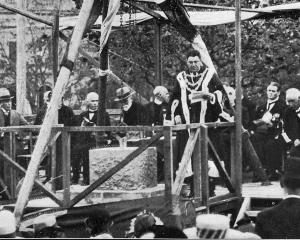''They boarded the train at Palmerston North, and shortly after leaving had a difference of opinion as to how long a man could stay on the top of a railway carriage without falling off. Two of the soldiers volunteered to climb to the top of the moving train and see it out, which they did.
''They travelled for some distance in the dark in and out of tunnels and never once lost their nerve. At Feilding they got a little dry and descended from their perch for refreshment, but went back to it immediately after.
''When they reappeared in the carriage they rubbed their sooty hands on the face of one of their sleeping companions, and had a high time. On getting back to their perch one soldier started walking along the top of the carriages, saying he was walking to Auckland.
''Eventually the train had to be stopped while the guard and inspector pulled the men down. As three of the men had lost their railway passes they were put off the train at Taumarunui, and spent the rest of the day there.
''They were greatly disgusted to find that this was a dry district, and left by the midnight express for Auckland. One soldier lost his hat and belt and had to buy a golf cap in Taumarunui. Two of the soldiers were black with soot from head to foot.''
• A paragraph which was quoted on Wednesday from the North Otago Times, with reference to the retirement - under, it was said, a superannuation scheme - of an old employee of the New Zealand Clothing Factory Company, was, we learn, based on a misapprehension.
There is no scheme of superannuation for the company's employees, nor is there any rule, as was implied in this case, that employees retire after 30 years' service.
The practice is, however, that men who have spent the greater part of their life in the employment of the company, and have faithfully performed their duty, have, on their retirement, been granted a liberal pension to enable them to enjoy ease during the declining years of their life.
• Some days ago a question was asked of the Minister of Defence in the House of Representatives concerning an allegation that our soldiers were exposed to grave danger on their voyage to the front by the fact that the transports were not adequately equipped with lifeboats.
The Minister has received a report on the subject from the Commandant. General Robin states that the question of lifeboats on troopships was fully considered before the departure of the main body.
It was then decided that as the ships sailed in convoys it was not necessary to provide a full supply of boats on every ship, as the others would be on hand to rescue men in case of disaster to any one ship.
As the reinforcements also sailed in convoys, it was still not considered necessary to provide a full complement of lifeboats on every single transport.
• An illustration of the prolific growth for which Otago Central is capable is given in a line of brown Spanish onions, grown by Mr M. L. Spratt, of Lowburn, whose property adjoins that of the Cromwell Development Company on Cromwell Flat.
In all Mr Spratt sent forward six sacks, and these have been quickly disposed of at equal to £14 a ton.
The onions are of uniform size, and, though the season is now wearing on, are in particularly sound condition. Melbourne onions are to day quoted at about 12 a ton, but the quality of these cannot be compared in any way with that of the Lowburn article.
- ODT, 1.10.1915












